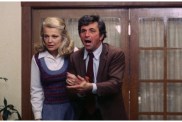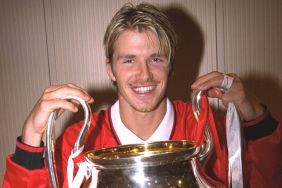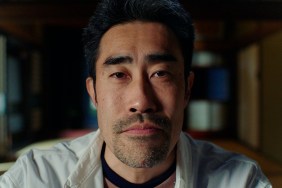Irish actor Cillian Murphy has been making many interesting acting choices over the past eleven or twelve years, first getting attention for his role in Danny Boyle’s 28 Days Later in 2002 before going on to a series of films of varying sizes and budgets. Most recently, he’s become known as Christopher Nolan’s go-to guy, appearing in all three “Dark Knight” movies as Dr. Jonathan Crane AKA The Scarecrow as well as playing a key role in Nolan’s sci-fi masterpiece, Inception.
Every once in a while, Murphy will appear in a smaller indie and that is the case with Rufus Norris’ Broken, a coming-of-age drama starring newcomer Eloise Laurence as “Skunk,” a teenage girl growing up in a small British cul-de-sac who sees the goings-on in that world through her own distinctive eyes. In the movie, Murphy plays the girl’s school teacher, Mike Kiernan, who experiences a great deal of pain when he loses his long-time girlfriend to Skunk’s father (played by Tim Roth), but he still tries to do the right thing to help Skunk only to get caught up in all the troubles being experienced by those around them.
It’s a fascinating character study and another great character for the actor, so ComingSoon.net got on the phone with Murphy last week to talk about the movie as well to try to learn more about his fifth collaboration with Christopher Nolan’s cinematographer Wally Pfister, who is making his directorial debut with next year’s enigmatic Transcendence in which Murphy plays an undisclosed role.
ComingSoon.net: Hey Cillian, how are you doing?
Cillian Murphy: I’m very well. How are you?
CS: I’m doing good. Thanks for taking the time to talk about the movie. It’s a really small British indie, but it’s a really nice surprise that came out of nowhere last weekend and I really enjoyed it. A great cast, a really great story.
Murphy: Well, that’s a great start to the interview. I’m delighted, delighted.
CS: I get the impression you’re a fairly well read guy, so were you familiar with Daniel Clay’s book before you got the script? Were you kind of familiar with it at all or was it a screenplay that just kind of showed up?
Murphy: No, I hadn’t read the book, but I had worked with the writer who adapted it twice before and I’m also a big fan of the director, as a theater director. I had seen many of his productions and we had tried to work together several times and Mark O’Rowe wrote “Intermission” and “Perrier’s Bounty,” two films I had been in the cast, so I was aware of those guys, but I hadn’t read the novel.
CS: “Intermission” is a great movie. I love that movie as well and I never made the connection between them with Mark, so have you two generally kept in touch and he kept you posted on what he was working on?
Murphy: Yeah, I mean, he’s a brilliant writer and both those guys are from the theater and I come from theater myself. I’ve done a lot of theater over the years and continue to do so. It’s always on my radar what theater writers and directors are doing, and Mark and Rufus are friends. But you know, as always, every decision you make in terms of being an actor is always supposed to be based on the script and the quality of the script. I read it, and it felt very emotionally affecting on the page. When somebody is that sort of affected when you read it on the page, you hope that it can be that affecting and powerful on screen, and I’m really pleased with the way it turned out.
CS: It’s interesting because it does have connections to “Intermission,” because it feels very theatrical. It has a fairly big ensemble cast, but it feels like it could’ve been done on stage, because there aren’t a lot of locations. It’s interesting how Rufus kind of broke it out and made it more cinematic by having different locations. He did a really great job for a first time film director. I was curious, as someone who knows these guys from theater, how did you know as an actor that they could pull off the film just from the screenplay?
Murphy: Well, I think it’s about telling stories and it’s just about different media. If you can understand the language of the theater, then hopefully you’ve got a very good grasp and an understanding of film that just involves a camera and editing, and it’s different schools. But, ultimately, it is about telling stories and both Rufus and Mark are fantastic storytellers where you have supreme confidence in their abilities. Rufus transitioned wonderfully, I think, from stage to film because he just knows how to tell a story and knows how to affect an audience emotionally and I think he shows that wonderfully in the film. The film is about Eloise Laurence, it’s her movie, it’s her performance and we’re just there to support her, and he coaxes this extraordinary performance from this young girl and that’s someone who’s truly talented.

CS: She’s absolutely amazing and I was curious about working with her because you have some pretty tough scenes with her, but she’s quite a force in the movie. I mean, even the scenes with the other actors like Tim Roth, she really holds her own. What was it like working with her?
Murphy: I’ve said this before, and I found her to be extraordinary and very inspiring because what she did and what we always try to do as actors is just exist and be in the moment. It was not intellectual, it was purely emotional and instinctual. That’s what you want to do as an actor, so I found working with her and all of the young actors in the piece, very affecting, because you watched them be and just exist in the role and in the moment. That was what we all strive for as performers, and she just had that instinctively. And that’s a credit to Rufus and Tim and the producers in which they created this environment where it just felt like just it happened. Because it was always super heavy material and, but going to work was the nicest, warmest sort of experience you could have. It was just fun and being, and it all came from Eloise because she was a true star I think her. When you see her in the film, everybody has gone, “Wow, that girl is just fantastic.”
CS: She’s really amazing and I’ll be curious to see what she does next. It was interesting to see Bill Milner, who started out very young as well, and seeing him in this movie kind of growing up a little more coming from the background of being a child actor.
Murphy: Yeah, he’s a great actor, too, a really great actor.
CS: Mike’s really sort of a tragic character who loses his woman fairly early on, and he gets into a lot of trouble even though he’s always trying to do the right thing. He’s one of the few really good people in the movie and he keeps getting into trouble, so was that something you were drawn to very early on or did Mark and Rufus suggest you’d be right for that role?
Murphy: Well, yes, I was drawn to it because I found it be a very authentic character. Both my parents are teachers and my grandfather was a headmaster and all my aunts and uncles are teachers, so I come from a long line of pedagogues, so I felt like I had to make a part in this role. I also appreciated the way that he’s a man who’s in his 30s who just can’t figure out exactly what it is that he wants to do. I had this whole backstory for him like he had the novel that sat in the drawer that he never finished. He was teaching because it was sort of the last resort for him, but then he starts teaching and he realizes that he’s quite good and I do think that good teachers can have such a vital affect on you. I always felt like most people talk about how a good teachers affect them. I also loved the way that in this movie Mike and Skunk have this friendship–they’re just friends and they like each other and they get on. He sees the potential in her, but it’s an adult and a child, and they’re not related, but it’s not weird. It’s a beautiful, lovely, well-drawn friendship.
CS: Were you one of those kids that had both of your parents as your teachers or were you able to get away from that?
Murphy: Well, I guess I’m the oldest and my parents are both very bright and very smart, and they probably had hopes for me beyond being a musician or being an actor. They’re very cool with what I do, and I had a great English teacher when I was in school who had a very profound effect on me growing up and encouraged me and sent me kind of in the direction that I ended up in. I have a great respect for what teachers do and that vocation, and for what my parents did and my grandfather did and my aunts and uncles did. So, even though I was probably an ***hole to teach (Laughs) I still really appreciate what they do.
CS: This movie is a nice payback to them as teachers, so have your parents seen you playing a teacher in the movie yet?
Murphy: Yes, yes, my parents have seen it and they love it and as I said, it’s a hard job. But, if you want to be there, if you want to stand up in front of a class of children or a class of teenagers, and that is your goal and vocation, that is a good thing. The impact that can have on a young person is huge as I already said, I really admire our teachers.
CS: You’ve been keeping pretty busy this past year so are you still shooting “Transcendence”? I’m really curious about that movie because I met Ray Kurzweil and I’m interested in the idea of the Singularity. It’s pretty heavy stuff.
Murphy: Yeah, I just wrapped that movie last night, actually, and yeah, I made my fifth movie with Wally Pfister but the first time as a director, and he’s just graduated beautifully from DP to director. He’s a natural. I think it’s a lovely script and a very interesting topic, so hopefully people will enjoy it when it comes out.

CS: Which concepts are easier to understandthe stuff that happens in “Inception” or the stuff with the Singularity incorporating machines with humans? Is this on a similar type level or is it a much smaller movie?
Murphy: No, I think it’s different. It’s a different scene completely. I mean, with “Inception,” it’s just about dreams and this is more about machines having senses and AI and they’re different movies, but they’re both big movies, and that idea is what relates one to the other, but you know what I like about it? They’re not franchise movies. They’re not remakes. They’re both standalone original films, and in this climate, they’re rare enough to come by.
CS: Absolutely. That’s always nice when we have a couple of those over the summer where they’re standalone movies that have come out of nowhere by surprise. Wally’s obviously always right there with Christopher Nolan when he’s shooting, so was it really obvious that he can step in and deal with actors and convey ideas and stuff like that as well?
Murphy: Yeah, I think directing is about communication really, and about being able to use the resources that you have effectively, and Wally’s a brilliant communicator. Obviously, the skills that he has as a DP–I mean, he’s one of the finest DP’s around at this point–so that stuff is second nature to him, but he is also a brilliant communicator and really respects actors. So, he’s made the transition wonderfully. He’s a real natural.
CS: That’s great to hear. I know you are going to be doing a movie with Ron Howard, “In the Heart of the Sea,” which is probably a very different thing. It’s a 19th century period piece on a whaling ship, like a “Moby Dick” type story. Are you going to be shooting that fairly soon or do you have something else in between now that you’re done with “Transcendence”?
Murphy: Well, my plan is to go on holiday, man, and see my family. (Laughs)
CS: It’s always nice to get a little break between movies. That’s definitely true.
Murphy: Yeah, it’s essential, and we start that movie in September in London, so I’m really looking forward to it. It’s a really tremendous script–really, really strong, and very old fashioned in a way. Again, it’s another movie that isn’t a franchise, it isn’t a remake. It’s just a standalone movie, and Ron Howard is such a tremendous filmmaker, so I’m really excited to be able to work with him.
CS: Did you have to do a lot of training for that? It sounds like the kind of thing where you’d have to do a lot of training or do you already have some experience on boats?
Murphy: (Laughs) I think we’ll all just be trying to find our sea legs on this movie, but yeah, there will be training, and everybody will have to learn. But that’s part of the joy of being an actor. You get to go and research and learn these skills that you’d never, ever have to learn as a civilian. You know you want it to be as authentic as possible and to not rely that much on green screen and to do it as much as in camera as possible. Again, I love that philosophy, which is something that Chris Nolan has always employed as well, which is always just to make as much stuff in camera, rather than shoot against a green screen, and Ron’s meant to do so I’m really looking forward to it.
CS: That’s great, and it’s great talking to you again. Good luck with “Broken.” I hope people go out to see it and these other movies also sound really fascinating, so hopefully we’ll get to see those next year sometime.
Murphy: It was nice to talk to you, too.
CS: Great. Talk to you soon and enjoy your vacation.
Murphy: Thank you, bye-bye.
Broken is currently playing in select theaters and available digitally as well.









